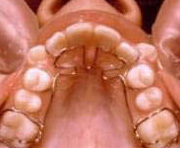I’ve read a lot on blogs and forums lately about people who are about to undergo surgery for their overjet. First and foremost I wonder why they didn’t get treatment earlier (around age seven) but that’s a topic for another blog post. Something that seems very common is to wear braces for overjet for a very long time, usually with rubber bands, after which the orthodontist gives up and says, “nope, this didn’t do anything, you’re going to need surgery”.
Functional orthodontists, however, claim that an overjet can’t be corrected with braces alone (and certainly not combined with tooth extractions) so according to them that would be a waste of time. In cases when traditional orthodontists believe they have solved the problem, they have instead created an illusion and an even worse functional problem has been produced.
You could die trying to move the teeth around in order to take care of an overjet but it’s not going to help since it’s a skeletal issue. The teeth are not to blame and should be taken out of the equation.
This is why I am an advocate for functional orthodontics. Read here what my guru Tooth975, a functional orthodontist who works for Yahoo Answers, says about this matter.
ALF, Crozat and Schwarz are all examples of functional appliances that are used to broaden the upper arch in both adults and children. They are sometimes also used to expand the upper jaw forward. The lower jaw can be brought forward by using a splint. Please note that these appliances don’t move the teeth but instead they focus on the jaws which is the right way to go! You might need braces afterwards but this final touch usually doesn’t take too long.
Here, Tooth975 explains how the lower jaw has to be guided forward by stretching the muscles. This may sound strange to somebody who hasn’t dealt with these problems themselves. The best way to explain this is that the lower jaw can sometimes “hang” too far back even though there is enough bone for a non surgical approach to work.
Furthermore, Tooth975 (I know, gotta love him, right?!) says that surgery should always be avoided if possible. Sometimes it’s necessary of course but in most cases the problem could also have been prevented if it had been dealt with at an early age.
It seems relevant to discuss if too many people are recommended to have surgery. If the only alternative presented is extraction/retraction orthodontics that only camouflages the problem and doesn’t solve it, this is a very serious matter. Recovery time after surgery is several months and there is always the risk of loss of sensation in the lower lip. Some patients lose a lot of weight because they can’t eat normally for a while. Not to mention the physical and emotional suffering involved. However, here in Sweden, this is what the county council and national health insurance are willing to cover.




